
In a study from The Australian National University and elsewhere, scientists have discovered that a protein, called Menin, contributes to the abnormal deactivation of specific genes in cancer cells.
The findings could lead to new and more effective treatments for lymphoma and lung cancer.
One of the hallmarks of cancer is that the normal regulation of genes is disrupted, and this causes cancer cells to look and behave differently from normal cells.
Cancer cells can switch off certain genes, keeping them in a dormant state.
By deactivating specific immune genes, some cancers are able to evade detection by the immune system, essentially becoming invisible. This allows cancer to grow and become more aggressive.
In the study, the team targeted the Menin protein using drug therapies, and they believed they can reactivate these genes, making the cancer cells once again visible and allowing the immune system to seek out and destroy them.
This research discovery has major implications for many different fields of research because we need to understand how cells make decisions and change the way they act in order to find new ways to treat cancer.
Menin has been previously shown to activate genes. However, this research unexpectedly found that Menin functions to keep these genes in an inactive dormant state.
This meant that by deleting Menin scientists could turn on the immune genes, which are essential to help the immune system to detect and kill cancer cells.
Importantly, specific drugs that inhibit Menin have been developed and are currently being tested in clinical trials for specific forms of leukaemia.
These findings expand the potential clinical uses of these drugs.
Researchers have shown that Menin inhibitors can be used in combination with other existing treatments to enhance the killing of lymphoma and lung cancer cells in the laboratory.
If you care about cancer, please read studies that a low-carb diet could increase overall cancer risk, and vitamin D supplements could strongly reduce cancer death.
For more information about health, please see recent studies about how drinking milk affects the risks of heart disease and cancer and results showing she was being treated for her lungs, but the problem was her heart.
The study was conducted by Professor Mark Dawson et al and published in Nature Cell Biology.
Copyright © 2023 Knowridge Science Report. All rights reserved.



